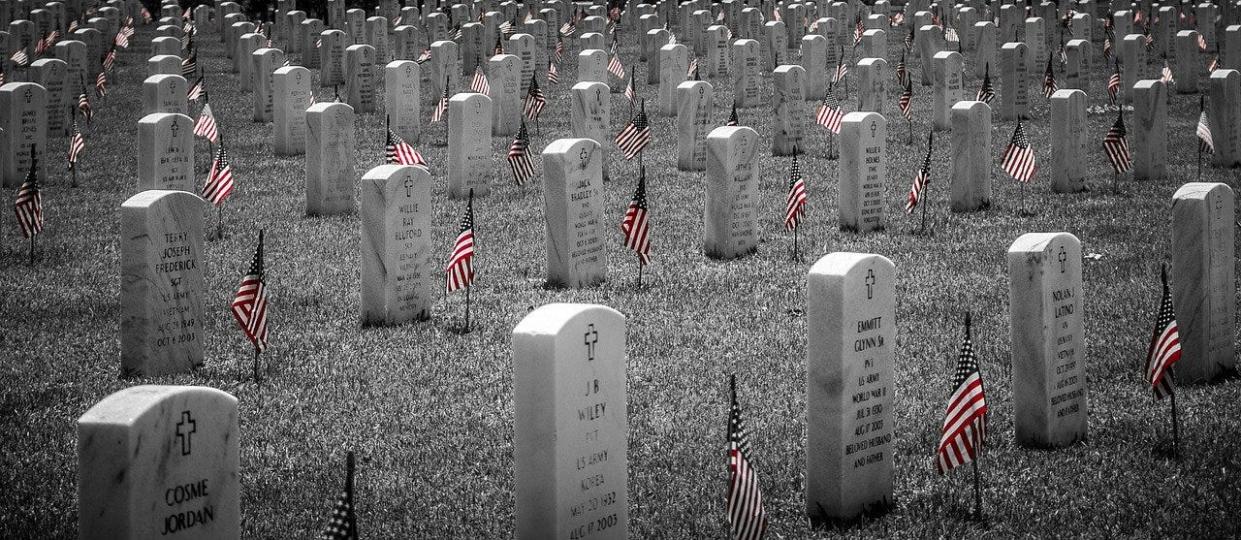MEMORIAL DAY: It's the cause, not the power, that has defined the valiant U.S. soldier

Many years ago, I visited the Shiloh National Park, located on the state borders of Tennessee and Mississippi.
Light-colored tombstones sprung up in ordered rows, or they rested scattered here and there, as if they started out like dandelion sprouts ad were blown to that spot by chance and took root.
Approximately 58,850 sunsets have fallen since those fateful two days in April 1862, when the Union and Confederate armies clashed with deadly intent in one of the first key battles of the Civil War.
When the smoke cleared and the echoes faded away, a total of 3,482 combatants had paid the ultimate price and total casualties (dead, injured, missing) numbers more than 24,000 — or an average of about 8.5 casualties per minute.
Among the dead was President Abraham Lincoln’s brother-in-law, Samuel B. Todd. Three years later — almost to the day — President Lincoln would become the war’s final casualty.
In writing about another battleground burial site, World War I poet John McCrae wrote, in part:
“We are the Dead. …
We lived, felt dawn, saw sunset glow,
Loved and were loved, and now we lie …
Take up our quarrel with the foe;
To you from failing hands we throw
The Torch …
If ye break faith with us who die
We shall not sleep.”
(“In Flanders Fields”)
The poet himself would not survive the war, dying of pneumonia.
War is something to hate, despise and fear. Reasonable efforts should be made to avoid it when possible.
But, when vicious conqueror-tyrants such as Hitler arise, there is no reasoning. Many peaceful, antiwar European countries discovered that in World War II.
Even in the neutral nations, Hitler’s armies devoured them up, stole their food and raw materials and left them to starve and freeze. Hitler's forces enslaved millions of human beings, sent many to Germany to work in war factories on starvation rations, and dispatched many others to killing concentration camps. Millions of innocent citizens in non-belligerent countries were forced out of their homes and lost all their property and their means of making a living. The brutality of the Japanese military toward the civilian population in China, the unprovoked attack and conquest of Kuwait by Saddam Hussein -- and, the unwarranted invasion of Russia into Ukraine are other examples in modern world history.
The start of the war was one-sided. For the attacked, it was fight or die -- or be torn away from their families and be enslaved.
Often the line between the ruthless oppressor and the preservation of freedom is lean and gaunt, even tenuous.
That's why we celebrate on Memorial Day the fighting men and women of the United States, dating back from the Revolutionary War to Iraq.
Most of them never wanted to go to battle; they didn't want to dispense deadly force against other human beings; they didn't want to suffer the rigors and risk of strife; and they didn't want to leave loved ones at home.
None of them wanted to die − or to kill.
Their glory is that they met the call of duty because that was what their generation was called upon to do. Their attitude was that if they didn't do it, who would?
They fought for freedom in foreign lands because they knew if the oppressors won and gained more resources, power, new weapons and momentum, it would be only a matter of time before the oppressors cast their greedy and lustful eyes on conquering the United States.
But, more than that, our military warriors adhered to the observation of John Dunne:
"No man is an island, entire of itself. … any man's death diminishes me, because I am involved in mankind, and therefore never send to know for the whom the bells toll (an emergency signal); it tolls for thee."
Our soldiers liberated nations so they could govern themselves. Not only did the U.S. bear the brunt of the war cost and casualties for the Allies, but we also poured in billions of dollars afterward to help nations − even those we had fought − rebuild.
Our valiant warriors have stemmed brutal marches of destruction and death, torn the locks off concentration camps, assured the freedom and prosperity of their fellow citizens and displayed a toughness of human endurance far beyond the limit of human frailty. To this point in history, our nation has been a bulwark and arsenal of preserving freedom, not a gleaming jackal of conquest. May it ever be so.
This article originally appeared on Bartlesville Examiner-Enterprise: MEMORIAL DAY: It's the cause, not the power, that defines heroes

